If you travel in France or a French-speaking country, it's important to be able to talk about what you like to eat and drink.
Here are some useful phrases to help you.
The 1-2-3 challenge
Join Scottish pupils as they give French a go!
Listen and guess what they are saying before trying yourself.
BOY 1: Tu aimes le fromage?
BOY 2: J’adore le fromage!
BOY 3: Oui, j’aime le fromage.
GIRL: Non, je n’aime pas le fromage!
Tip: This video can be used as an interactive introduction to this topic or as a recap on key vocabulary and phrases already learnt.
Remember!
It doesn't matter if your pronunciation isn't perfect. Try your best and have fun!
Talking about food and drink in French
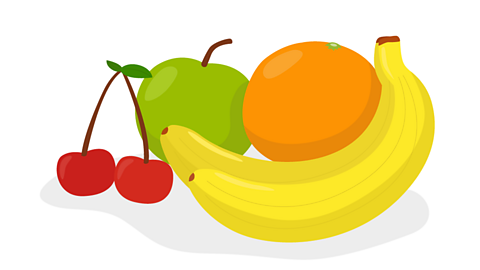
When talking about food and drink, it's useful to be able to talk about what you like and don't like.
The French for 'to like' is Sorry, something went wrongCheck your connection, refresh the page and try again.. This form of the verb is called the infinitive.
You can recognise an infinitive in English as it begins with to, such as 'to like' or 'to eat'.
In French, you can spot an infinitive by looking at the end of the verb. All French infinitives end in either -er, -ir or -re.
As aimer ends in -er it is called an -er verb.

Saying what you love
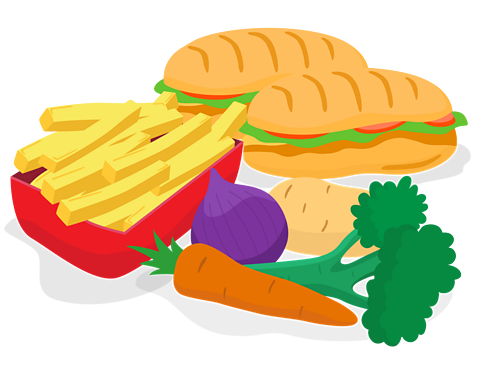
To say 'I love' you say:
- Sorry, something went wrongCheck your connection, refresh the page and try again. – I love
Can you see that the end of the verb is no longer -er but -e? The ending of the verb changes depending on who is doing the action.
Remember that before the verb, you use the word for I - je. As the verb adorer begins with a vowel, je changes to j' to make it easier to say.
( Je + adore = J'adore)

Saying what you like
To say 'I like', you say:
- Sorry, something went wrongCheck your connection, refresh the page and try again. – I like
(Je + aime = J'aime)
Saying what you don't like
To say 'I don't like', you need to add ne or n' (before a vowel) before the verb and pas after the verb.
- Sorry, something went wrongCheck your connection, refresh the page and try again. – I don't like
Food in French
Here are some words for food so you can say what you like or don't like.
Did you notice that all the words begin with either le, la, l' or les? This means 'the' and it is called the definite article.
You can learn more about this in Masculine and feminine nouns.
| French | English |
|---|---|
| Sorry, something went wrongCheck your connection, refresh the page and try again. | chips |
| Sorry, something went wrongCheck your connection, refresh the page and try again. | cheese |
| Sorry, something went wrongCheck your connection, refresh the page and try again. | fruit |
| Sorry, something went wrongCheck your connection, refresh the page and try again. | ice cream |
| Sorry, something went wrongCheck your connection, refresh the page and try again. | hamburger |
| Sorry, something went wrongCheck your connection, refresh the page and try again. | ham |
| Sorry, something went wrongCheck your connection, refresh the page and try again. | vegetables |
| Sorry, something went wrongCheck your connection, refresh the page and try again. | egg |
| Sorry, something went wrongCheck your connection, refresh the page and try again. | bread |
| Sorry, something went wrongCheck your connection, refresh the page and try again. | fish |
| Sorry, something went wrongCheck your connection, refresh the page and try again. | chicken |
| Sorry, something went wrongCheck your connection, refresh the page and try again. | sandwich |
| Sorry, something went wrongCheck your connection, refresh the page and try again. | meat |
| Sorry, something went wrongCheck your connection, refresh the page and try again. | soup |
| Sorry, something went wrongCheck your connection, refresh the page and try again. | salad |
| Sorry, something went wrongCheck your connection, refresh the page and try again. | pizza |
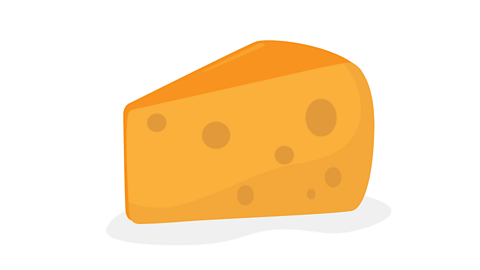
Now you can say what you love:
Sorry, something went wrongCheck your connection, refresh the page and try again. – I love pizza
Sorry, something went wrongCheck your connection, refresh the page and try again. – I love cheese
Sorry, something went wrongCheck your connection, refresh the page and try again. – I love vegetables
…what you like:
Sorry, something went wrongCheck your connection, refresh the page and try again. – I like pizza
Sorry, something went wrongCheck your connection, refresh the page and try again. – I like cheese
Sorry, something went wrongCheck your connection, refresh the page and try again. – I like vegetables
…and what you don't:
Sorry, something went wrongCheck your connection, refresh the page and try again. – I don't like pizza
Sorry, something went wrongCheck your connection, refresh the page and try again. – I don't like cheese
Sorry, something went wrongCheck your connection, refresh the page and try again. – I don't like vegetables

Did you know?
Did you notice that in French you say 'the' before the noun, whereas in English you don't?
You can also say that you like more than one thing if you use the word for 'and' – Sorry, something went wrongCheck your connection, refresh the page and try again..
Sorry, something went wrongCheck your connection, refresh the page and try again. – I like cheese and bread
Sorry, something went wrongCheck your connection, refresh the page and try again. – I like fish and chips
Drinks in French
Here are some words for drinks.
| French | English |
|---|---|
| Sorry, something went wrongCheck your connection, refresh the page and try again. | coffee |
| Sorry, something went wrongCheck your connection, refresh the page and try again. | water |
| Sorry, something went wrongCheck your connection, refresh the page and try again. | orange juice |
| Sorry, something went wrongCheck your connection, refresh the page and try again. | apple juice |
| Sorry, something went wrongCheck your connection, refresh the page and try again. | milk |
| Sorry, something went wrongCheck your connection, refresh the page and try again. | tea |
Saying what you prefer
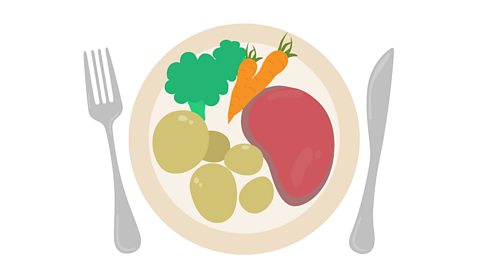
You might want to say that you like something, but you prefer something else.
- Sorry, something went wrongCheck your connection, refresh the page and try again. is the French word for 'to prefer'.
To say 'I prefer' you say:
- Sorry, something went wrongCheck your connection, refresh the page and try again. – I prefer
You can also add the useful conjunction Sorry, something went wrongCheck your connection, refresh the page and try again. (but). Conjunctions are joining words that link together parts of a sentence.
Sorry, something went wrongCheck your connection, refresh the page and try again. – I like vegetables, but I prefer meat.

Mealtimes
Here are words for mealtimes in French.
| French | English |
|---|---|
| Sorry, something went wrongCheck your connection, refresh the page and try again. | breakfast |
| Sorry, something went wrongCheck your connection, refresh the page and try again. | lunch |
| Sorry, something went wrongCheck your connection, refresh the page and try again. | afternoon snack |
| Sorry, something went wrongCheck your connection, refresh the page and try again. | dinner |
| Sorry, something went wrongCheck your connection, refresh the page and try again. | meal |
How do I say 'I eat' in French?
The French word for 'to eat' is Sorry, something went wrongCheck your connection, refresh the page and try again..
Manger is a regular verb like aimer - to like.
The endings of verbs change, depending on the person or thing doing the action, for example, je - I, tu - you, elle - she or it, il - he or it.
Regular verbs change in the same way, so once you know how a regular verb changes, you will be able to use lots of different verbs in the same way.
Below are the endings for regular -er verbs. You remove the -er from the infinitive manger, then you add these endings.
| Pronoun | Stem | Ending | Example | English |
|---|---|---|---|---|
| je | mang | e | Sorry, something went wrongCheck your connection, refresh the page and try again. | I eat |
| tu | mang | es | Sorry, something went wrongCheck your connection, refresh the page and try again. | you eat |
| elle | mang | e | Sorry, something went wrongCheck your connection, refresh the page and try again. | she eats |
| il | mang | e | Sorry, something went wrongCheck your connection, refresh the page and try again. | he eats |
Did you notice that the verbs sound the same, even though the endings are different?
How do I say 'I drink' in French?
The French word for 'to drink' is Sorry, something went wrongCheck your connection, refresh the page and try again.. This is an irregular verb, so it doesn't change in the same way as regular verbs. This means you need to remember the different forms.
You remove the -re from the infinitive boire, then you add these endings.
| Pronoun | Stem | Ending | Example | English |
|---|---|---|---|---|
| je | boi | s | Sorry, something went wrongCheck your connection, refresh the page and try again. | I drink |
| tu | boi | s | Sorry, something went wrongCheck your connection, refresh the page and try again. | you drink |
| elle | boi | t | Sorry, something went wrongCheck your connection, refresh the page and try again. | she drinks |
| il | boi | t | Sorry, something went wrongCheck your connection, refresh the page and try again. | he drinks |
Did you notice that they all sound the same? This is because s and t are silent letters.
You can also use the infinitive of manger or boire to say what you like to eat and drink.
Sorry, something went wrongCheck your connection, refresh the page and try again. – I like to eat ice cream
Sorry, something went wrongCheck your connection, refresh the page and try again. – I like to drink orange juice
Key French sounds
Below are some important French sounds that you have heard in this topic. Try practising them yourself out loud.
- e
There are different ways of saying and writing e in French. One way of saying the e sound can be written as Ă©, -er, es, ez and et.
All these letter combinations make the same sound, which is not found in English. It is a short, sharp sound which you might use to attract someone's attention.
Sorry, something went wrongCheck your connection, refresh the page and try again. - chips
- e
Another way of saying e in French sounds like the e in the English word egg.
This can be written as e before two consonants, è, ê, ai, aî, ei and e before a final c, l or t.
Sorry, something went wrongCheck your connection, refresh the page and try again. - but
Remember that the s at the end of a word is silent.
- th
These letters make the same sound as t in English.
Sorry, something went wrongCheck your connection, refresh the page and try again. – the tea
More on Talking topics
Find out more by working through a topic
- count6 of 12

- count7 of 12

- count8 of 12
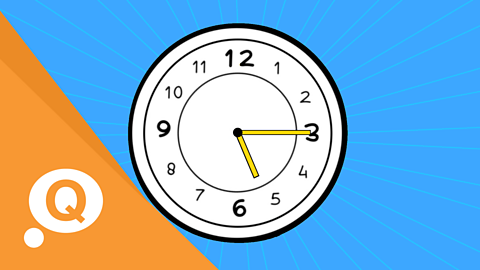
- count9 of 12
